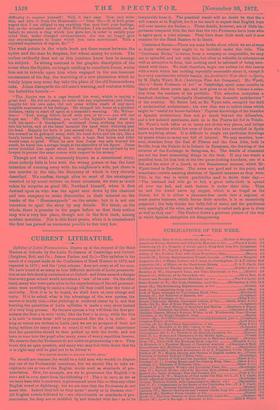CURRENT LITERATURE.
Syllabus of Latin Pronunciation. Drawn up at the request of the Head Masters of Schools, by the Latin Professors of Cambridge and Oxford. :(Deighton, Bell, and Co.; James Parker and Co.)—This syllabus is the -result of a request made at the Conference of Head Masters in 1870, and repeated in 1871; and the joint scheme' does not come at all too soon. We have heard of as many as fear different methods of Latin pronuncia- tion at one Scholarship examination at Oxford : and there seemed a danger that every great school would introduce a use ' of its own. On the other land, many who were quite alive to the imperfections of the old pronunci- ation were unwilling to make a change till they could hear the voice of authority. Now, it is to be hoped, we shall have at once change and unity. If it be asked, what is the advantage of the new system, the answer is briefly this,—that philology is rendered easier by it, and that learning the quantities of Latin syllables is made a very short instead of a very long process. By the new system a boy will from the first pro- nounce the first a in make evils,' like the first a in away, while the first in mulct 'a cheek-bone' will be pronounced like the a in father. As long as verses are written in Latin (and we see no prospect of their not being written for many years to come) it will be of great importance that the quantities should be thus picked up with the words, and not have to ooze into the pupil after many years of weary repetition lessons. We observe that the Professors do not insist on pronouncing v as w. They leave this an open question, and many who may feel little doubt that the w is right may still be glad not to be driven to
"Non patries walidas in wiscora wertite wires."
'We should not venture (he would be a bold man who would) to dispute any one of the Professorial assertions, but we should like to take ex- ception to one or two of the English words used as standards of pro- nunciation. How, for example, are we to pronounce the English o in more and in corn, apart from the following r? The o in more, as far as we have been able to ascertain, is pronounced more like aw than any other English vowel or diphthong ; but we are sure that the Professors do not mean this. Indeed they tell us they mean "nearly as in German ohne." All English vowels followed by r are objectionable as standards of pro- nunciation, for they are so modified by and blended with the r as to be inseparable from it. The practical result will no doubt be that the o will remain as in English, for it is too much to expect that English boys will ever master the Italian o. These details, however, are of little im- portance compared with the fact that the two Professors have been able to agree upon a joint scheme. They have done their work, and it now remains for the Head Masters to do theirs.


































 Previous page
Previous page